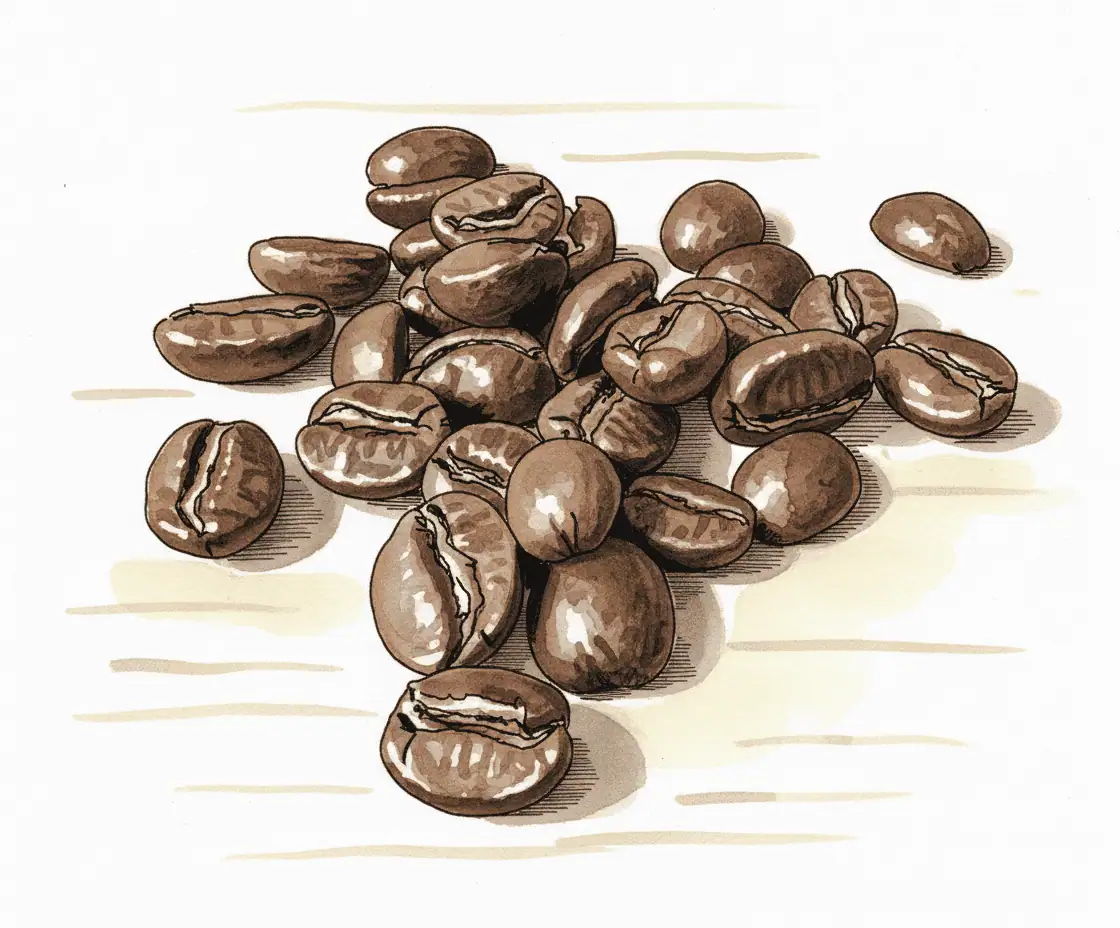Average altitude
Mid altitudes (around 1200–1500 meters) produce beans that offer a balance between sweetness and acidity. Growing conditions are still mild, yet the beans often develop more refinement than at lower elevations. This results in a brighter flavor profile, sometimes with subtle fruit or floral notes. Mid-altitude regions are common in countries such as Colombia, Mexico, and parts of Central America.
Beans

Brazil, Um
Brazil, Um is een premium specialty koffie uit de regio Espírito Santo in Brazilië, geproduceerd door de Um-familie. De Catucaí-variëteit biedt een perfecte balans van zoetheid en fruitige accenten, met florale tonen die de smaak verrijken. Dankzij de pulped natural verwerking en medium roast blijven de aroma’s helder en complex. Deze koffie heeft een SCA-score…

Brazil, Yellow Catuaí
Deze Brazil Yellow Catuaí van A Matter of Concrete komt uit Santo Antônio do Amparo in Minas Gerais. De variëteit groeit rond 1100 meter en kreeg een washed anaerobic verwerking. Het kopprofiel is sappig en complex, met een kruidig cola-accent dat aan root beer doet denken. De filterbranding geeft helderheid en een lange zoete afdronk.Herkomst…

Brazilië
Deze single origin uit Sul de Minas komt van Fazenda Do Lobo en bestaat uit de variëteit Yellow Catuai. Het lot is natural verwerkt en in Leiden op een Giesen W6 meerdere keren per week op maat gebrand door Borgman en Borgman. Verwacht een fruitig zoet profiel met tonen van kers, bes en melkchocolade, een…

Brazilië
Deze Brazilië van Koffiebranderij De Ouwe Smidte komt uit de regio Cerrado Mineiro. Het is natural verwerkt, wat tijdens het drogen de zoetheid en body merkbaar versterkt. In de kop proef je rust en een lage zuurgraad, ideaal voor dagelijkse espresso of cappuccino. Smaak met melkchocolade, geroosterde amandel en een vleug rozijn, geeft zoete balans.…

Brazilië – Fazenda do Salto
Brandmeester’s Brazilië Fazenda do Salto is een single origin uit Sul de Minas. De extended fermentation natural geeft diepte met rijp fruit en schone zoetheid. De lichte branding houdt de kop helder zodat oorsprong en proces spreken. Verwacht hazelnoot honing vanille en melkchocolade met medium body en milde aciditeit.Zetmethode stuurt het profiel. Kies voor espresso…

Brazilië – Fazenda do Salto
Deze Yellow Bourbon van Fazenda do Salto, gebrand door Brandmeesters, komt uit Sul de Minas. De boon is licht gebrand en verwerkt met extended fermentation natural, wat zorgt voor romige body en heldere zoetheid. Verwacht melkchocolade, geroosterde hazelnoot en een hint van honing, met milde appelachtige zuren en een lange, schone afdronk. Dit profiel werkt…

Brazilië – Grunewaldt
Deze single origin komt van de familie Grunewaldt in Alto Santa Rosa, Espírito Santo. Op circa 1060 meter groeien Red en Yellow Catuai in koele, winderige heuvels. De koffie wordt gewassen verwerkt voor een helder en schoon kopprofiel. Verwacht bloemige aroma’s, lage aciditeit en tonen van melkchocolade, met hazelnoot, vijg en appel. KOSU brandt wekelijks…

Brazilië – Fazenda Pedra Preta Agroforestry Farm
Deze specialty koffie komt van een agroforestry plantage in Careaçu, Mantiqueira de Minas, op circa 1.300 meter. Mundo Novo en Arara groeien tussen mahonie, macadamia, bananen en avocado, wat biodiversiteit verhoogt en input verlaagt. De oogst van 2022 en 2023 is natuurlijk verwerkt met patio droging en gecontroleerde statische droging tot 35 graden voor een…

Brazilie • Diamond
Brazilië Diamond komt uit Minas Gerais, tussen 750 en 1100 meter, en wordt geleverd door kleine plantages. De koffie is uitsluitend als espressobranding verkrijgbaar, met een donkere roast die body en structuur versterkt. Verwacht een volle smaak met tonen van noten, donkere chocolade, honing en bruine suiker, mooi in balans en prettig zoet. Details over…

Brazilie • Monte Belo
Monte Belo is een single estate koffie uit Cerrado, Brazilië, geteeld op 900 tot 1200 meter en al sinds 1935 in handen van de familie Ferraz. De variëteiten Mundo Novo, Red en Yellow Catuai en Yellow Bourbon zorgen voor een gebalanceerd profiel. De natural en pulped natural verwerking benadrukken zoetheid en een honingachtige nasmaak. Verwacht…

Brazilië Bosch Bakkie
La Jeu Coffee presenteert Bosch Bakkie, een Braziliaanse single origin uit Cerrado Mineiro. De medium roast levert een romige, volle espresso met pure chocolade, amandel en toffee. De pulped natural verwerking houdt de zoetheid hoog en de body stroperig.Zo komt de kop tot leven, zowel puur als in melk. Start met het espresso recept van…

Brazilië Casa Blend
The Brazilië Casa Blend from Locals Coffee Roasters is a specialty blend from five family farmers in Minas Gerais and Cerrado Mineiro, affiliated with Cooxupé. Medium roasted weekly for a full yet smooth cup, with notes of dark chocolate, roasted nut and caramel, low acidity and a creamy body. The beans are naturally processed, which…

Brazilië Colombia blend
Deze blend verenigt Cerrado zoetheid met Huila frisheid voor een ronde, levendige espresso. Verwacht pure chocolade, hazelnoot en karamel, gelift door een vleug groene appel. De Braziliaanse pulped natural geeft body, de gewassen Colombia zorgt voor helderheid.Espresso recept 18 g in, 40 g uit, ca. 24 s.Beste in melkdranken dankzij volle body en cacao.SCA score…

Brazilië Dutra
Deze Braziliaanse Catuaí van Moto Coffee komt uit Matas de Minas en is natural verwerkt. Verwacht melkchocolade, hazelnoot en karamel, met lage zuurgraad en volle body. De afdronk is lang en schoon, met cacao in de nasmaak.Oorsprong Matas de Minas Brazilië Fazendas DutraVariëteit Red en Yellow CatuaíVerwerking natural voor zoete romige espressoAanbevolen vooral als espresso…

Brazilië Fazenda Passeio
Pacamara Coffee Roasters presenteert Fazenda Passeio uit Sul de Minas, een natural espresso met rijpe zoetheid. De kop is romig en vol, met tonen van amandel, rozijn en melkchocolade. Handpluk en langzaam zongedroogd fruit geven helderheid, terwijl de zuurgraad mild en wijnachtig blijft. Geschikt voor espresso als basis of puur, en vriendelijk in melkdranken ook.Brandprofiel…

Brazilië Samba Reserve
Badeta presents Brazilië Samba Reserve, an approachable specialty coffee from Carmo de Minas, made from Arabica varieties of small family farmers. The medium to medium-dark roast produces a silky body with notes of milk chocolate, caramel and a hint of brown spices. The bean is naturally processed, with sun-drying and after-drying to preserve sweetness…
Mid-Altitudes (around 1200–1500 meters)
Looking for a beautiful balance between sweetness and acidity in the cup? Then beans from mid-altitude regions are a great choice. These areas are common in countries like Colombia, Mexico, and parts of Central America. Here you get the best of both worlds: enough coolness for a refined taste, yet enough warmth for good sugar development.
How altitude affects espresso flavor
At elevations of roughly 1200 to 1500 meters, coffee cherries still ripen more slowly than at sea level, but not as slowly as at very high altitudes. This creates a balanced espresso: a mildly sweet base, often with subtle fruity or floral hints, alongside a pleasant, not overly dominant acidity. These coffees are known for their approachable yet refined character. They are often ideal for those who enjoy an espresso with a clear flavor, but without the sometimes “sharp” edge of very high-grown beans.
Chemical composition: balance of sugars and acids
Mid altitudes still give the coffee plant enough coolness to build complexity, yet enough warmth to encourage sweeter notes. The beans generally have a slightly lower density than true high-grown beans, but remain firm enough to develop a wide flavor palette. You will notice the acids are a touch less pronounced, allowing the sweetness to come forward. This can yield a balanced cup of espresso with both freshness and a soft body.
Processing methods: diversity is key
In many regions at these elevations, there is active experimentation with different processing methods. The washed method remains popular, but honey and semi-washed processes are also often used, depending on local traditions and the desired flavor profiles. Thanks to slightly higher temperatures (compared to high mountains), sun-drying beans is often easier. This allows farmers to apply natural or pulped natural methods, which in turn leads to more sweetness and sometimes a hint of fermentation in the taste.
Climate and microclimate
At 1,200 to 1,500 meters, conditions usually mean mild temperatures, regular rainfall, and still plenty of sun. This kind of environment is ideal for coffee shrubs. They are protected from extreme heat, but also from the cold of great heights. As a result, the growing season is stable and fairly predictable. Microclimates arise from local variations in rainfall and hours of sunshine. A shrub on one mountainside can therefore produce slightly different flavor nuances than one on the slope next to it.
Yield and resilience
In general, the yield here is better than at very high elevations, because the plants are less stressed by colder nights or thin air. This means farmers can often produce slightly higher volumes while quality remains high. Moreover, the shrubs can often stay healthy for longer, provided they are well maintained. A stable yield is beneficial for the local community, as farmers’ income is less dependent on erratic harvests.
Choosing coffee varieties
In this altitude band, many Arabica varieties are found, such as Caturra, Colombia, and Bourbon. Farmers often choose plants that strike a good balance between yield and flavor. Some varieties are resistant to diseases like "coffee leaf rust", which is an important factor in areas with higher humidity. This allows farmers to grow with confidence, knowing they will harvest consistently tasty coffee.
Coffee from mid-altitudes is therefore highly recommended for anyone seeking a balanced espresso. Expect subtle fruit or floral notes, complemented by a mildly sweet body. No sharp extremes, but a rich, approachable flavor that many drinkers appreciate.
A selection for those who are open to a lively and complex coffee experience.
